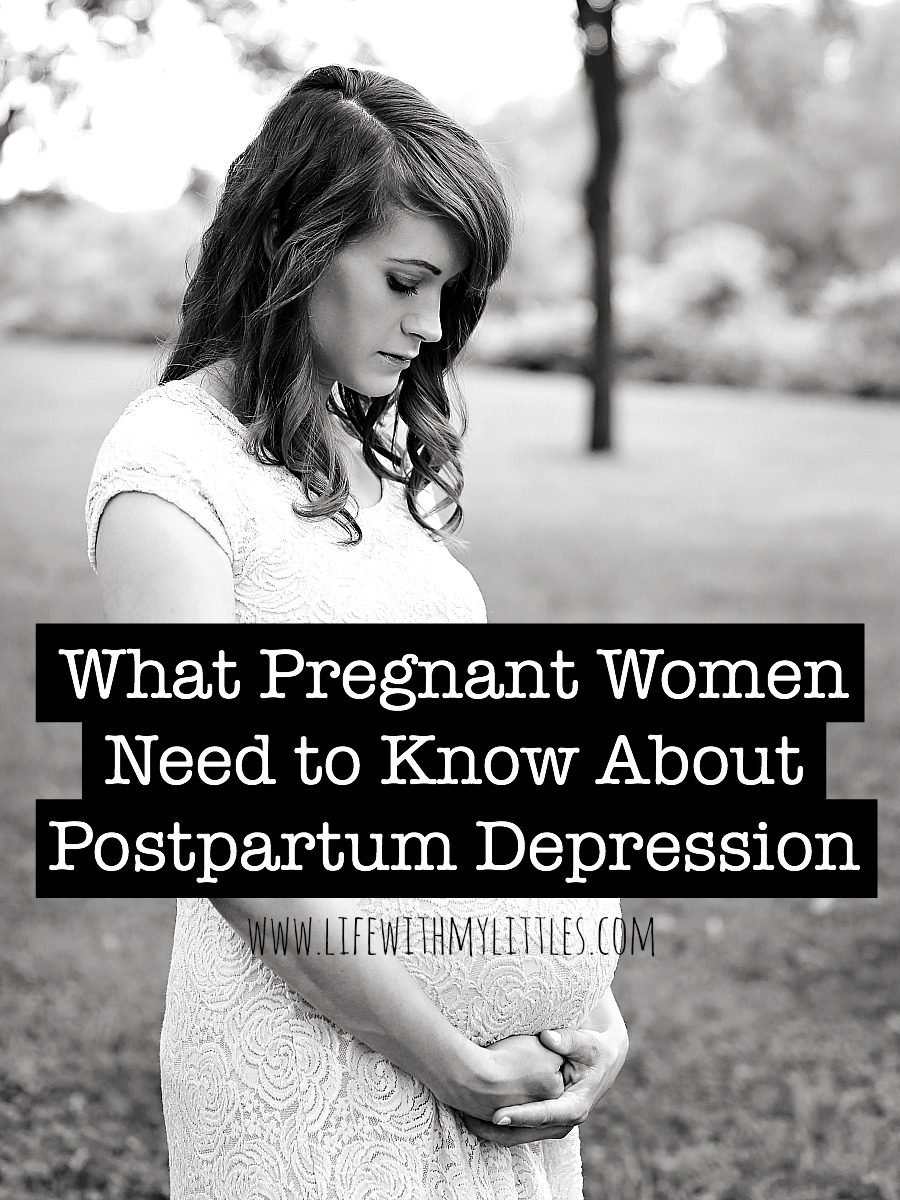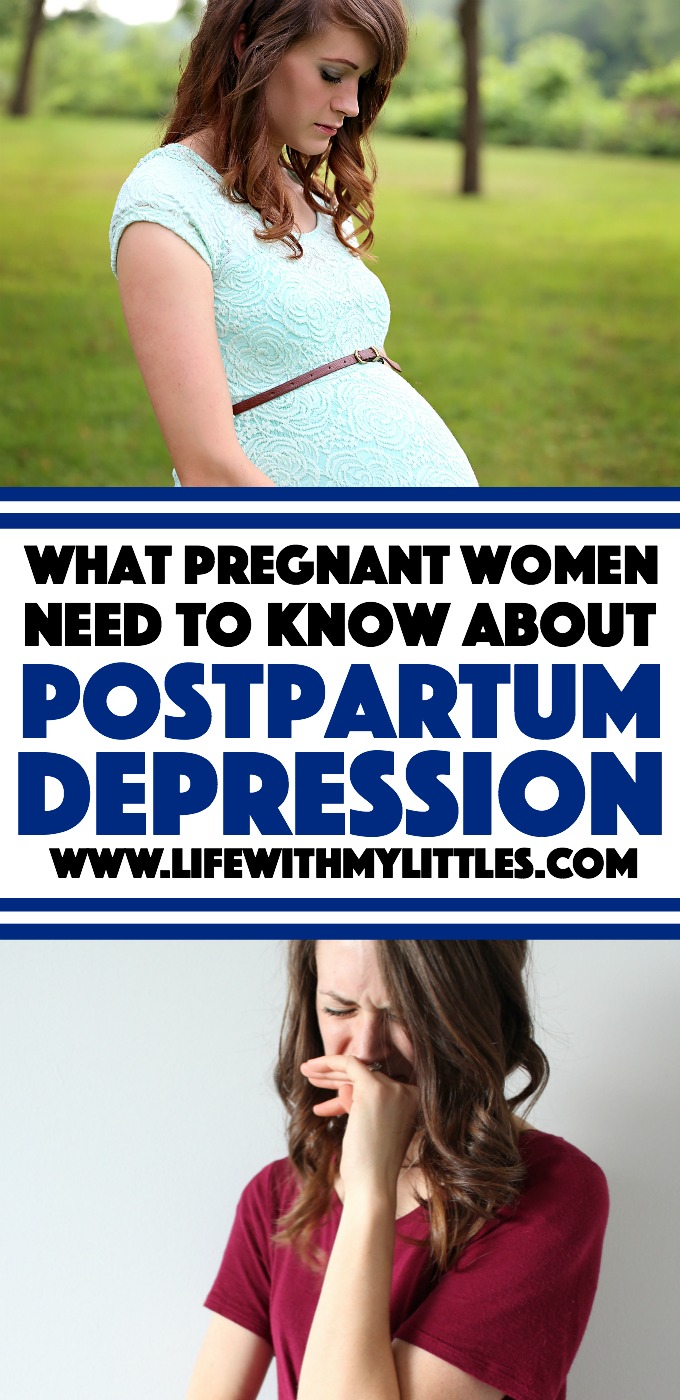Postpartum depression is incredibly common, and knowing about it before your baby is born can really help. Here’s what pregnant women need to know about postpartum depression

Before my first son was born almost four years ago, I had never really heard anyone talk about postpartum depression. Even once my son was born when I filled out the new mom survey I never really thought much about why they were giving it to me.
When my daughter was born two years ago, I still didn’t think about it as something that was serious. Nobody talked to me about it, and I definitely wouldn’t have been prepared if I had developed postpartum depression.
Now I am preparing for the birth of my third child, and I still don’t see much talk about postpartum depression. It’s one of those taboo but very common things women don’t talk about like infertility, miscarriages, or problems breastfeeding. And even though I’ve never suffered from postpartum depression myself, I know a lot of people who have. And I know a lot of people who were completely unprepared for what it did to them.
Having a baby is a crazy stressful, emotional, hormonal time in your life, and sometimes it can really mess with your brain. If the feelings of anxiety and stress and sadness don’t go away after two weeks (source), you may be suffering from postpartum depression. You may have heard of the “baby blues” which aren’t serious and should go away after a few days or a few weeks. But if it’s been two weeks and you are still depressed or have severe mood swings, cry a lot, have a hard time bonding with your baby, are withdrawing from family and friends, have a change in eating habits or sleeping habits, feel fatigued, anxious, irritable, angry, worthless, guilt, or inadequate, don’t enjoy things you used to, have thoughts of harming yourself or your baby, that is not normal and you need to get help for postpartum depression.
I talked to a lot of mothers who have suffered publicly and privately, and I want to tell you 15 things you should know about postpartum depression before your baby is born so you can be prepared and know how to get help if you need it.
1. Postpartum depression can happen to anyone. Having a history of mental illness in your family or yourself does not mean that you will either get it or not. Lots of women are diagnosed with postpartum depression and have no history of depression or mental disorders in their family. You might not even have postpartum depression with your first baby, but then be diagnosed with your second. Even if you don’t feel depressed at all during your pregnancy, you could still get it. There’s really no way to know if you are going to have it or not, so the best way to get ahead of it is to prepare yourself before your baby is born.
2. Know that you are not alone. A LOT of women deal with postpartum depression, both silently and publicly, and having it doesn’t mean that you have done something wrong or that there is something wrong with you. It’s just a complication of giving birth, and up to 1 in 7 women have it (source). Chances are, you have friends who have postpartum depression or have suffered from it in the past. It really is nothing to be ashamed of.
3. Admitting something is wrong is the first step. If you don’t feel like yourself, don’t brush it under the rug. I talked to a lot of moms who had a hard time admitting that something was wrong. These symptoms are not normal, and you might need to get help to deal with them. The first step to getting help is to admit that there is a problem.
4. Don’t be afraid to ask for help. You may not be able to fight postpartum depression on your own, so once you have admitted something is wrong, ask for help. It’s totally fine (actually it’s great!) to ask for help. You shouldn’t be shy about having postpartum depression and you don’t need to hide it. That definitely won’t help. Be open about what you are going through and know that it’s okay to talk about it.
5. Talk to someone and get the support you need. So many of my friends said that once they admitted something was wrong and talked to their doctor, things slowly started getting better. Doctors can help you by finding counseling or support groups and prescribing medication. It might take a few tries to find a doctor or therapist who listens and understands what you are going through, but don’t give up. One of my friends told me that online support groups were very helpful, too. Find one where you can talk to other moms going through postpartum depression (The Emily Effect is a great one). It will help you see that you really aren’t alone!
6. Medication can really help. Sometimes talking about what’s going on isn’t enough, and your body will need a little more to start the healing process. Antidepressants can really help you get into a different mindset and start feeling a little better. You also might have to try different kinds before you find one that works for you, so be patient.
7. Reduce stress for after the birth of your baby any way you can. Don’t move two months after your baby is born, don’t offer to plan a big party or school fundraiser with a newborn in the home, and don’t plan on renovating your kitchen as soon as you get home from the hospital. Stress will not help, so do things you can to help reduce stress and prepare before your baby is born so you will be ready for the transition (here are 25 things to do before your baby is born that can help get you prepare for your baby’s birth).
8. Postpartum depression can happen even a year or more after your baby is born. I had multiple moms tell me that they didn’t get postpartum depression until after their baby was over a year old. You always need to be aware of how you are doing and take care of yourself, too.
9. Use the Edinburgh Postnatal Depression Test. They usually give it to you at the hospital and your baby’s 2-week appointment, and I think again at your postpartum OB/GYN visit, but you should take it even after that, just to see how you are doing. It will help you see any red flags and notice things you might not otherwise. Print it out and keep it as a resource for yourself.
10. Try to avoid any triggers that cause you stress or anxiety. If you think having meals brought to your house will stress you out because you have to answer the door, arrange for freezer meals to be brought before your baby is born. If holding your baby causes you stress or anxiety, ask someone else (your husband or a close friend) to hold your baby. Breastfeeding might stress you out and make you feel depressed, and if that’s the case, it might not be for you. Bottles and formula exist for a reason and you definitely aren’t a bad mom for feeding your baby formula. Just know what triggers set you off and try to avoid them.
11. Dismiss people who belittle you or make you feel bad. Unfortunately, some people don’t understand or don’t accept postpartum depression as a real thing. And if someone is making you feel bad because you haven’t connected with your baby or you don’t want to go out for a girls’ night, dismiss them and move on. You don’t need anyone in your life who isn’t going to be on your side, and having them around will only make things worse.
12. Give your family permission to tell you if they see you exhibiting signs of postpartum depression. Sometimes you might not realize what is happening, but others close to you will. So before your baby is born, tell your husband or your mom or sister or whoever you are close to that if they see you acting depressed or withdrawing to let you know. Like I said, you never know if you are going to suffer from postpartum depression, and telling your family what the warning signs are and having them help you just in case is a good thing.
13. Postpartum depression can happen with adoptive mothers, too. I know this post is geared toward pregnant women, but if you happen to read this and are in the process of adoption, just be aware that you could get it, too. It never hurts to be prepared and informed.
14. If you are religious, turn to God through prayer, scripture-study, church worship, and relying on Jesus. I know this tip isn’t for everybody and I’m not saying that things will immediately get better, but it can help to be close to Christ and feel His love for you.
15. It can get better. Through small steps, you can fight and overcome postpartum depression. It’s not easy and it doesn’t happen overnight, but there is always hope and there are always people who will support you and lift you up. Don’t ever give up and don’t ever stop trying.
Postpartum depression is scary and it’s something so many mothers face. But you don’t have to face it alone, and knowing about it and knowing the warning signs and how to fight it before your baby is born can give you a head start if you do end up getting diagnosed with postpartum depression.
I want to give a special thanks to all the amazing mothers who reached out and helped me with this post. I couldn’t have written this without you, and I really hope this post can make a difference and help raise awareness of postpartum depression.

Kersten Lindhardt says
This is a great list! PPD isn’t talked about enough! I actually had postpartum anxiety after my daughter was born, and so I didn’t recognized that I had a very real problem for months because I thought I was just stressed! (We moved 3 times in the first 3 months of my daughter’s life and then my sister died and I wish I could go back and tell myself it’s okay to take care of me even when life is stressful!) So I loved that you mentioned the anxiety side in this post. Writing a post about this kind of struggle would be hard, but you did AMAZING and it is going to be a great resource for both pregnant women and women suffering it.
Chelsea Johnson says
Oh my goodness, that sounds awful! I’m so sorry you had to go through that but I’m glad you figured out what was going on. Thank you so much, Kersten! I certainly hope so!